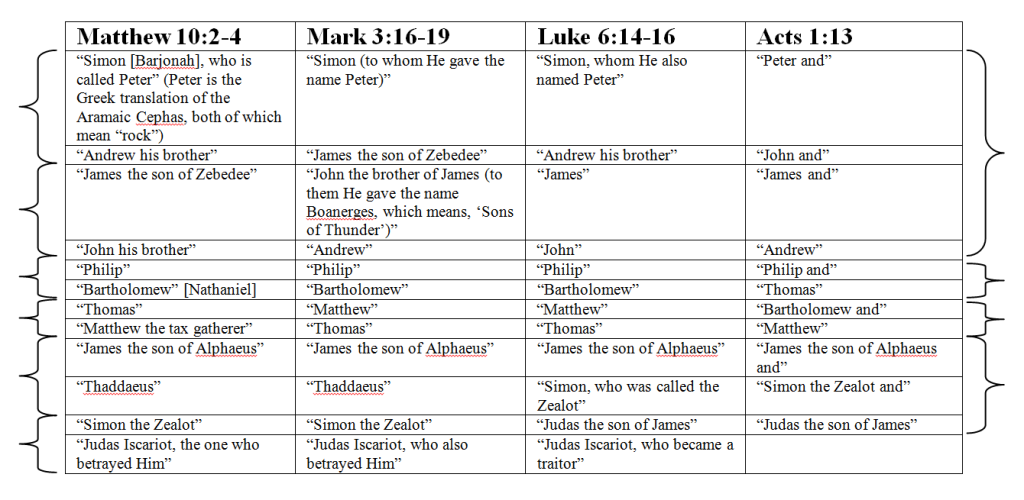Mat 10:2-4 Was it at this time that Jesus chose the twelve apostles from among His disciples, or when? Cf. Luk 6:12-13. What is the difference between an apostle and a disciple; i.e., what is the main calling of an apostle? Hint: the Greek word apostolos means literally one who is sent out as a messenger; see John 13:16, 2Co 8:23, Phil 2:25 and cf. 1Co 12:28, Eph 4:11. How does Matthew’s order of the apostles differ from Mark’s and Luke’s? See Mar 3:16-19, Luk 6:14-16. Why do you suppose Mark lists Peter, James and John first? Cf. Mar 5:37, 9:2, 13:3, 14:33, 1Pe 5:13. Why do you suppose both Mark and Luke list Matthew before Thomas, whereas Matthew lists himself after Thomas? How does this support the traditional view that the apostle Matthew did in fact author this gospel? By what name does John refer to Bartholomew? See Joh 1:43-51 and note that Bartholomew means literally “son of Talmai” (cf. NASB text note), so that Nathaniel was likely his given name. By what name does Luke refer to Thaddaeus? See Luk 6:16, Act 1:13; cf. Joh 14:22. Might “James of Alphaeus” and Thaddaeus / “Judas of James” be related? How does Mark say in Mar 6:7 that Jesus sent out the apostles? What might lead us to believe that Matthew’s order reflects this pairing? Hint: consider the punctuation in our English translations which reflects the Greek grammar, the pairing of family members, and that Matthew’s listing of the twelve occurs here where they are sent out in pairs as opposed to Mark’s and Luke’s listing which occurs when they were first called. Which apostle is named first in each listing, by what other names is he known, and who was his father? See Mat 16:17, Joh 1:42, Gal 2:8-9, and note that “Barjona” means son of Jonah or son of John (today we’d call him Peter Johnson!). Why do you suppose he is listed first in each listing? See Mat 16:13-20, Act 2:14, 3:1,11-12, 4:8, 5:3,14-15, 8:14, 10:1-5,44-48. Does the fact that Peter is listed first and was a clear leader in the early church support the Roman Catholic view that he was the first in a succession of popes in whom final authority resided and to whom all other Christians must ultimately accede? See Act 15:6-19, Gal 2:7-11; cf. Mat 20:25-28. Which apostle is listed last in each listing? Why is that? See Matthew’s note in Mat 10:4. Where was he likely from? Note: “Iscariot” is a Hebrew word meaning “man of Kerioth”, a city perhaps south of Judea; see Jos 15:25. What aspect of Judas’ character is linked in Scripture to his betrayal of Jesus? See Joh 12:3-6, Mat 26:14-16, Luk 22:3-6. What indication do we have that Judas did not intend by his actions to become a betrayer that led to Jesus’ death? See Mat 27:3-4. Considering that Judas was one of the twelve apostles who was closer to Jesus than nearly all other disciples, that he together with the other apostles was given “authority over unclean spirits, to cast them out, and to heal every kind of disease and every kind of sickness”, that he prayed, preached, and had the same outward appearance of the other apostles (see Act 1:17), and that he no doubt supposed himself to be “helping out” Jesus at least early in his ministry and perhaps even in the betrayal (supposing that Jesus would be forced to manifest His power as the Messiah the people were expecting and establish His earthly kingdom), what should we understand about the deceitfulness and danger of avarice? Cf. 1Ti 6:8-10, Heb 13:5. Which of the original apostles was the first to die? See Mat 27:5, Act 1:18. Was his death only physical? See Mat 26:24, Act 1:25. Which of the apostles was the second to die? See Act 12:2. Who is believed to be the last to die? See Rev 1:9. After Peter, Andrew, James and John, and Judas, which two of the remaining twelve apostles are mentioned most frequently in Scripture, and from what book does most of our information about them come? See Joh 1:43-46, 6:5-7, 11:16, 12:20-22, 14:5,8-9, 20:24-29, 21:2. Observe that Philip’s name is Greek (lover of horses); what does this fact and the episode in Joh 12:20-22 indicate about whether he was a Palestinian or a Hellenistic Jew? What is another name for Thomas, and what does it mean? See again Joh 11:16, 20:24, or 21:2 and text note. Which three of the twelve apostles do we know only by name and nothing else from Scripture ? Hint: except for Judas Iscariot they are mentioned last in all three lists of the apostles.
